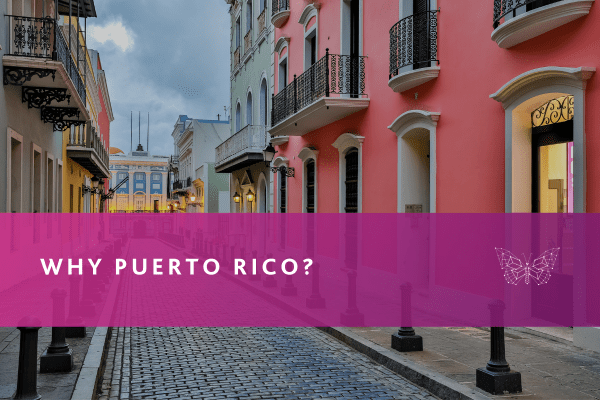Tax incentives, cost of living, and an abundance of investment opportunities are causing immigrant investors to take notice of the island.
In recent years, Puerto Rico has enacted a series of business and investor-friendly initiatives to attract investment to the island. This is good news for foreign nationals who wish to obtain their green cards through the EB-5 immigrant investor program by making capital investments that create or preserve US jobs.
Puerto Rico offers both distinct advantages and challenges for EB-5 investors, and understanding them may affect one’s decision of whether or not to pursue an EB-5 project on the island.
What makes Puerto Rico a potential EB-5 and impact investment hotspot
Since the passage of the EB-5 Reform and Integrity Act of 2022, the minimum investment amount for EB-5 is now $1,050,000. However, that minimum is reduced to $800,000 for investments in Targeted Employment Areas (TEAs) as well as rural and infrastructure projects. Because of Puerto Rico’s high unemployment, the majority of the island qualifies as a TEA, meaning investors can participate for the reduced amount.
High unemployment also means almost all of the island falls within Qualified Opportunity Zones. As we’ve previously discussed, EB-5 and OZ can be used on the same project, so the many OZ opportunities in Puerto Rico can result in a greater selection of EB-5 projects as well. Puerto Rico is not only a great place to invest because of the lower minimums, but as a place to make a real impact through the creation of jobs central to EB-5’s mission.
While the US is a preferred destination for immigrants from all over the world, one major consideration is taxation, as certain types of taxes may be higher in the US than in the immigrant’s home country. Though it is an American territory, Puerto Rico has different taxation rules than the US mainland, specifically when it comes to business income and capital gains. Depending on your sources of income and where you wish to reside, the island may offer a lot of benefits when it comes time to your balance sheets.
Puerto Rico’s advantages as a destination for immigrants
One aspect of relocating to Puerto Rico that investors shouldn’t overlook is its cost of living. Overall, consumer prices, restaurant prices, grocery prices, and rent are all higher in the US than in Puerto Rico. And while it may be tempting to move to a major US urban area, remember that some states have high state income taxes in addition to a higher cost of living.
Living in Puerto Rico does not mean you are prevented from visiting the US mainland. To meet the Presence Test, you only have to accomplish one of the following:
- Be present in Puerto Rico 183 days out of the tax year
- Spend at least 549 days in Puerto Rico over the current and previous two tax years, including at least 60 days per year
- Spend no more than 90 days in the mainland US throughout the tax year
- Spend more days in Puerto Rico than in the US throughout the tax year and earn less than $3,000 in income from the mainland
Tax incentives for residents of Puerto Rico
In 2019, Puerto Rico passed Act 60, which provides significant tax benefits to businesses and those with capital gains. Investors who receive an Act 60 Investor Resident Individual decree can potentially pay a 0% capital gains tax rate on both short and long-term capital gains, as well as gains from investment interest and cryptocurrency.
Businesses based in Puerto Rico can also benefit from lower tax rates. In the US, business income is often taxed at 37%, which includes corporate taxes and taxes on dividends. After adding state and local taxes, the cumulative rate can be greater than 50%. Puerto Rican corporations (and LLCs) are treated as foreign corporations for US tax purposes, meaning income is not subject to US corporate tax other than for income sourced in the US.
The corporate tax rate in Puerto Rico is an 18.5% normal tax plus a graduated surtax, with dividends subject to a 15% tax rate. However, thanks to Act 60, some businesses can qualify for a corporate rate of 4% and a dividend rate of 0%.
There are specific rules for export services companies, those that provide services to clients outside of Puerto Rico and unrelated to the island. Companies that receive an Act 60 Export Services decree are taxed at a 4% corporate tax rate and receive a 100% exemption from taxes on all distributions from earnings and profits. Small businesses can be exempt from 100% of municipal and state property taxes during their first five years of operation, with a 75% exemption after that or for larger businesses.
It’s important to note that not all revenue can be passed through at the 4% corporate tax rate as income earned by business owners or employees will be taxed at ordinary income tax rates. However, as mentioned above, this rate may be much lower than what you might experience in a high income tax state.
In addition, export businesses receiving an Act 60 exemption that have actual or projected total revenue of more than $3 million must directly employ at least one full-time employee residing in Puerto Rico (which could potentially be the business owner), and the Office of Industrial Tax Exemption performs independent audits of exempt businesses at least once every two years.
When considering whether a move to Puerto Rico is advantageous for tax purposes, it’s also important to understand the island’s specific rules meant to limit tax evasion. Just as Puerto Rico has advantages over the mainland US, there are also challenges potential immigrant investors should be aware of.
The challenges of choosing Puerto Rico as an EB-5 immigration destination
In order to qualify for Puerto Rico’s tax incentives, you must prove you are a bona fide resident of the island. To do that, you must pass three tests: the Residence Test, the Tax Home Test, and the Closer Connection Test.
The Presence Test, as discussed above, relates to your physical presence. So long as you are in Puerto Rico for more than 183 days in a tax year, you can qualify. Even if you are in the US or another country for part of a day, it counts so long as you were in Puerto Rico on any part of that day.
There are also exemptions to the Presence Test. If you leave the island to receive medical treatment (or accompany a parent, spouse, child, or stepchild to qualifying medical treatment), you are still counted as being in Puerto Rico. And if you are evacuated due to disaster, you may also qualify even though you are outside of Puerto Rico.
The Presence Test also grants 30 automatic days of international travel per tax year, which means you actually only need to be in Puerto Rico for 153 days out of the year, so long as you spend more time in Puerto Rico than the US during the tax year (and more than 60 days in Puerto Rico if you are trying to satisfying the requirements by spending 549 days out of a three-year period on the island).
The Tax Home Test is simple: you cannot have a tax home outside of Puerto Rico during any part of the tax year. This refers to your primary or regular place of employment, and if you do not have that, your primary place of residence. There is a special exemption during the year of your move if you have another tax home for part of that year.
For those who freelance, the Tax Home Test can be tricky due to working with clients from all over the world. That’s why it’s important to consult with an account and/or tax attorney to understand the implications of your income sources and how they affect your tax home status.
The Closer Connection Test is meant to discourage those who wish to use Puerto Rico as a tax haven by living there only “on paper.” The idea is that you must prove you have a closer connection to Puerto Rico than you do to the United States. This is subjective, but there are reliable ways to prove you had a closer connection to Puerto Rico than the US during a tax year.
The IRS takes into account where your permanent home is located, where your immediate family resides, where your personal belongings are, where your principal bank is located, where you conduct business, where you hold a driver’s license, where you are registered to vote, and where you participate in organizations like charities, professional organizations, religious and political groups, or social and cultural organizations.
To ensure you pass this test, it’s best to move to Puerto Rico and not have a residence in the US where you spend half your time, to do business and bank in Puerto Rico, and to join local organizations to show your connection to the community. In short, your move to Puerto Rico should be legitimate and not simply a tax strategy.
Export businesses looking to qualify for Act 60’s Export Services tax incentives also have requirements that must be satisfied. Business operations must be maintained in Puerto Rico, all owners and employees must be paid a reasonable salary, and businesses generating more than $3 million must directly employ one Puerto Rican resident who participates in business activities. Act 60 businesses must also undergo independent audits at least once every two years.
While these rules are complicated, they are meant to ensure the system is not abused. Puerto Rico offers advantages to immigrants willing to legitimately move there, but to receive those benefits, you have to make sure you’re compliant.
In addition to these tax issues, EB-5 immigrant investors also have to worry about satisfying the many requirements for their immigration applications. Immigrants making a new home in Puerto Rico need to be able to trust that those they work with are committed to compliance and best practices.
Building trust with immigrant investors
There are so many things to worry about when moving to a new country, from understanding the language to getting your kids in schools to filing the correct paperwork. In addition, EB-5 issues like putting funds at risk and qualifying for TEA status can affect these investors’ applications, so trust is an important component of any EB-5 offering.
EB-5 investors depend on these investments to get their visas, so security, transparency, and compliance are key for them to feel confident about making such a big life change. They want access to all the information and documents they need, and partners with a proven track record of success.
JTC offers a comprehensive suite of EB-5 solutions, including escrow and fund administration services from capital raise to return of investment, tailored to your specific offering and your clients’ unique needs. Our award-winning technology platform with 24/7 online access is paired with an experienced client services team ready to offer their expertise to help you and your clients take advantage of opportunities in Puerto Rico and across the US.
Key contact
Stay Connected
Stay up to date with expert insights, latest updates and exclusive content.
Discover more
Stay informed with JTC’s latest news, reports, thought leadership, and industry insights.
Let’s Bring Your Vision to Life
From 2,300 employee owners to 14,000+ clients, our journey is marked by stability and success.




















